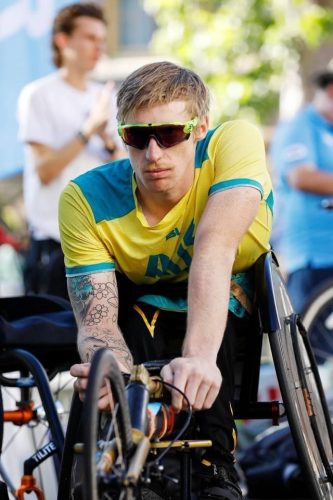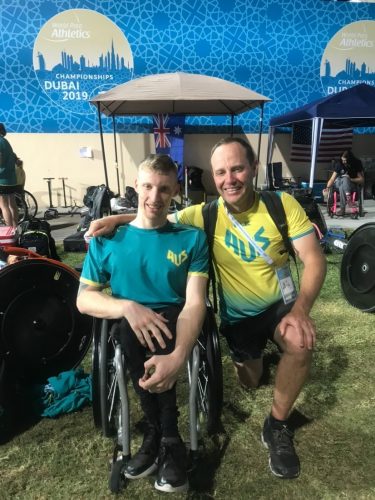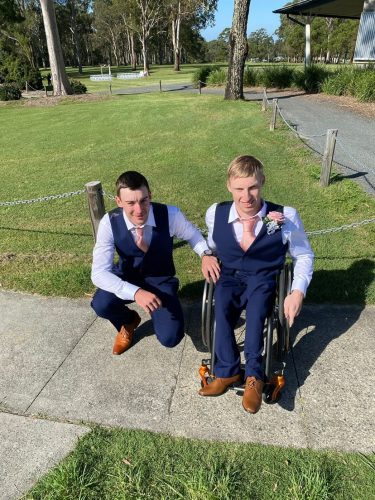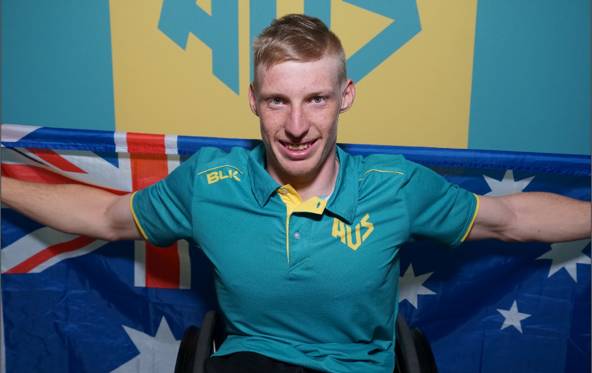While training for the Paralympics, Luke Bailey became the fastest wheelchair racer in Australia and the second-fastest in the world.
In our latest catch-up with Luke, he told us how he got into racing and what advice he has for anyone else trying to break into the sporting world.
“I wasn’t aiming for it. It just happened.”
Where it started:

My whole family has been committed to sport for as long as I can remember. Regardless of the sport, nearly every member has a passion and love for keeping active and striving for goals. This desire to achieve is why my family has done well, especially on my mum’s side; they all love their sport, they can’t get enough.
Being born with spina bifida wasn’t going to stop me from participating in my family’s sporting heritage. I trialled every sport I could get my hands on, but nothing seemed to stick until I found wheelchair racing.
Kurt Fearnley, a legend in the racing world, has represented Australia at five Paralympic Games, winning three gold, seven silver, and three bronze medals. I tried his racing chair, and I haven’t stopped since.
Luke’s Top Tips: Three things to remember
- Give everything a go, and when you do, give it your all.
- If you enjoy it, do it.
- If you don’t enjoy it, don’t do it.
My racing career:
I’ve been racing for ten years now, but I’ve only been competing for three or four. For years, I was doing it for the fun and fitness of it all, but as soon as I got a new coach in Newcastle, I became more competitive, both in Australia and overseas.

Andrew Dawes, a five-time Paralympic racer himself, became my coach in 2017, and he still is. He actually got me into the sport. I met him when I was 12, then met him again in 2017, so it’s nice to be coached by him since he is the reason I race.
Dawes came on board when I was training for the 2018 Commonwealth Games. I was injured and unable to compete, and I’d hit a training slump.
He called me up and asked me if I wanted to go to Switzerland to race. It was incredible to be able to travel to compete again. I came out of those races with some great times, and we took it from there.
The two of us trained harder and faster than ever before, and it wasn’t long before our next goal became Tokyo 2020 (or 2021 now).
Luke’s Top Tip: Find the right coach who pushes you every day to do better, not just with sport but the rest of your life too. When you’re training long hours, your career and personal life become so connected, and it’s essential to have a coach that understands that.
Staying motivated:
The path to the Paralympics is not an easy one. Training twice a day, five or six days a week, and competitions every other weekend, I barely have time to think of anything other than racing.

No matter how gruelling the training gets and how much pressure I feel, I am adamant that I never hate what I do. For instance, a couple of weeks ago, people from Athletes Australia came up to watch me race, and I felt a lot of pressure to do well. You’ve just got to remind yourself why you love competing and have fun with it.
Some days, though, are more difficult than others. 2020 was tough as I was more isolated than I had been before. On challenging days, I am lucky to turn to my family and coach for support.
My family has been a big part of my sporting career. They’ve always been there for me during the hard times in my racing career. Whether I’m injured, tired, or lacking motivation, they’re always there for me. You know, I’ve got a niece now as well, so that makes me get up the next day to train and do her proud.
Luke’s Top Tip: It’s important to have a support network; for me, that’s my family and my coach. But it’s also important to talk to the right people. Last year, I started talking to a sports psychologist, which helped me because they knew what I was going through, and I could work through many mental blocks that I had. My coach also tells me I’m going to be the greatest athlete in the world one day, and that really helps.
When times get tough, it’s important to talk to the right people. If you need support, reach out to one of our qualified staff via a Telehealth appointment https://paraquad.org.au/what-we-do/paraquad-telehealth/
Or reach out to the people at Beyond Blue https://www.beyondblue.org.au/ for support.
